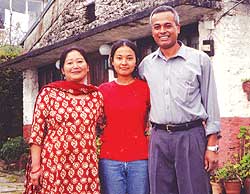 Major Mohan Khatri had a bright future in the Royal Nepal Army. But he found military life too confining, its hierarchy rigid, and many of its methods dubious. So, after a two-year officer's training at the US military academy in Fort Leavenworth, Kansas, and another three years with the Nepali contingent of UN peacekeepers in southern Lebanon, Major Khatri took early retirement to work on his dream project: a tourist lodge in the mountains.
Major Mohan Khatri had a bright future in the Royal Nepal Army. But he found military life too confining, its hierarchy rigid, and many of its methods dubious. So, after a two-year officer's training at the US military academy in Fort Leavenworth, Kansas, and another three years with the Nepali contingent of UN peacekeepers in southern Lebanon, Major Khatri took early retirement to work on his dream project: a tourist lodge in the mountains.
It took him over a year to find the right place: a south-facing slope on a ridge at 2,800 m on the Jiri highway with a great view of the Jugal Himal range to the north, and scented pine forests all around. He took a bank loan and began construction of the rustic cabins.
The resort was completed in 1997, and was a popular stopover for many trekkers taking the Jiri route to Lukla. When the Khimti hydroelectric project was started, the lodge became the preferred R&R site for Norwegian and Finnish engineers working on construction. Being from the cavalry, the major loved to ride and take care of horses, and for good luck called his lodge Horseshoe Resort.
But Mohan Khatri's luck ran out on the night of 24 October when a group of armed Maoists came up to the hotel while he was having dinner, dragged him outside, shot him, and slashed him with khukuris. His body lay in the undergrowth on a slope below the hotel till the afternoon of the next day, before the army arrived from Barabise.
Reporters who visited Mude three days after the event said employees were still too shocked to speak. Saili Lama worked at the hotel, and her face showed a mixture of terror and sadness. When Mude villagers come running up in a group to see who the reporters were, her face went pale with fear.
The villagers are devastated. The 45-year-old major was a benefactor: not only did the hotel provide employment, but he had helped renovate three schools in the area and given 35 girl students scholarships. He was working on an ambitious project to establish a well-equipped health post with a maternity ward which was going to be inaugurated after Tihar. The villagers can't think who will complete the hospital and help the schools.
Khatri was aware of the dangers, and Maoists came around to force him to pay a "revolutionary tax". He was careful to steer a neutral path between the Maoists and plainclothes army patrols who roamed the mountains. He didn't get involved in politics, and thought that his charity work and his popularity with the villagers would protect him.
After killing him, the attackers set two hotel vans on fire. These were vehicles Khatri had used many times as ambulances to ferry sick villagers to hospital in Kathmandu.
Caretaker Tilak Shrestha says that after killing the major, the attackers ransacked the rooms of the resort, looking for weapons. They found it hard to believe that there were none. Shrestha was repeatedly threatened, but they finally concluded that the major didn't keep guns. Then they took all the money from the cash register, a tape recorder and also some cassettes. The major's wife, Krishna Kamal, was in the kitchen when her husband was attacked.
Man Bahadur Lama sold Khatri the land for the hotel. He says he had warned the major that he may be in danger because of his army connection. But Khatri told him: "Man Bahadur, don't worry about me. Take care of yourself, be safe." Villagers suspected local Maoists could have blamed the major for passing information to the army that led to the raid earlier this year on a Maoist hideout on Sailung, two days away from Mude, in which a dozen guerrillas were killed.
In an email to a friend a few months before he was killed, Mohan Khatri appeared to be aware that things were getting dangerous. He wrote: "In the kuna kapchas of our country where the majority of the neglected, exploited and oppressed villagers are living, there is no lessening of support for the maobadis, there is no government, and there is no alternative for the people. They have nothing to lose. Keeping aside the morality and the methods of the maobadis, they seem to offer the only hope. I am keeping myself busy with the construction of our rural health centre.the villagers' support keeps me going...


